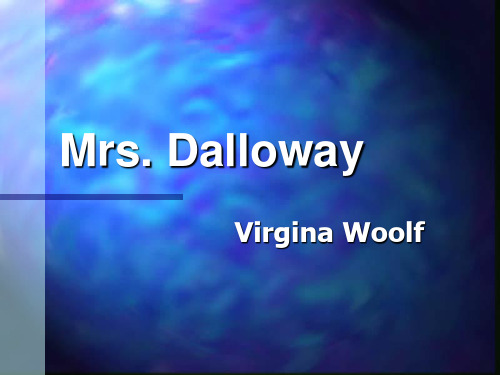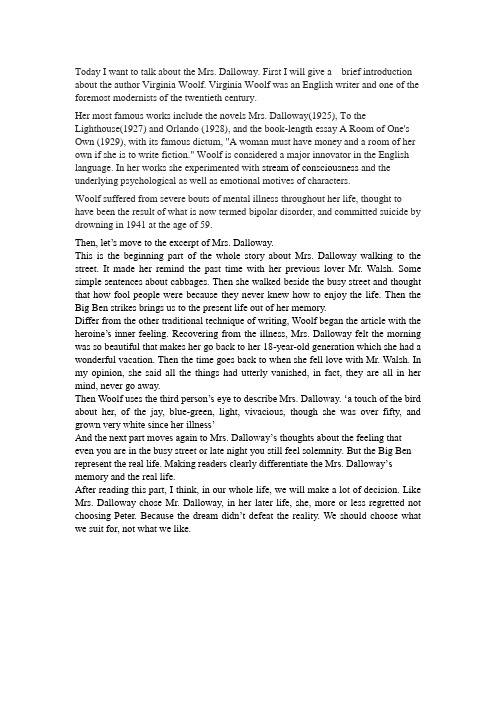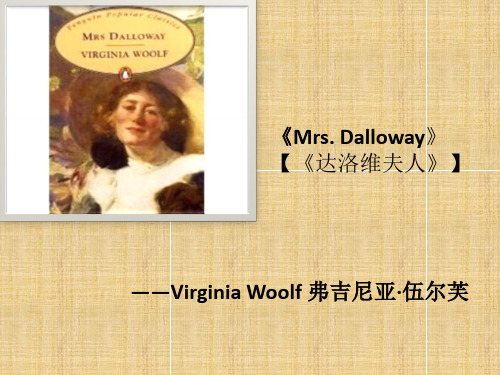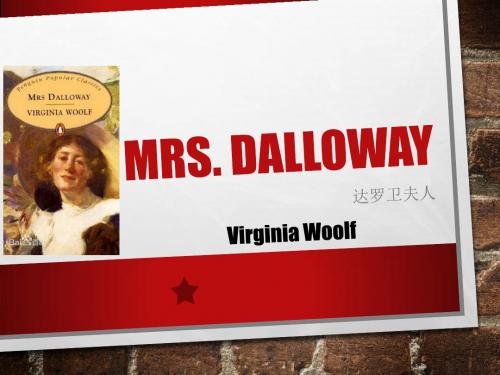Mrs Dalloway
- 格式:ppt
- 大小:78.50 KB
- 文档页数:21



Today I want to talk about the Mrs. Dalloway. First I will give a brief introduction about the author Virginia Woolf. Virginia Woolf was an English writer and one of the foremost modernists of the twentieth century.Her most famous works include the novels Mrs. Dalloway(1925), To the Lighthouse(1927) and Orlando (1928), and the book-length essay A Room of One's Own (1929), with its famous dictum, "A woman must have money and a room of her own if she is to write fiction." Woolf is considered a major innovator in the English language. In her works she experimented with stream of consciousness and the underlying psychological as well as emotional motives of characters.Woolf suffered from severe bouts of mental illness throughout her life, thought to have been the result of what is now termed bipolar disorder, and committed suicide by drowning in 1941 at the age of 59.Then, let’s move to the excerpt of Mrs. Dalloway.This is the beginning part of the whole story about Mrs. Dalloway walking to the street. It made her remind the past time with her previous lover Mr. Walsh. Some simple sentences about cabbages. Then she walked beside the busy street and thought that how fool people were because they never knew how to enjoy the life. Then the Big Ben strikes brings us to the present life out of her memory.Differ from the other traditional technique of writing, Woolf began the article with the heroine’s inner feeling. Recovering from the illness, Mrs. Dalloway felt the morning was so beautiful that makes her go back to her 18-year-old generation which she had a wonderful vacation. Then the time goes back to when she fell love with Mr. Walsh. In my opinion, she said all the things had utterly vanished, in fact, they are all in her mind, never go away.Then Woolf uses the third person’s eye to describe Mrs. Dalloway. ‘a touch of the bird about her, of the jay, blue-green, light, vivacious, though she was over fifty, and grown very white since her illness’And the next part moves again to Mrs. Dalloway’s thoughts about the feeling that even you are in the busy street or late night you still feel solemnity. But the Big Ben represent the real life. Making readers clearly differentiate the Mrs. Dalloway’s memory and the real life.After reading this part, I think, in our whole life, we will make a lot of decision. Like Mrs. Dalloway chose Mr. Dalloway, in her later life, she, more or less regretted not choosing Peter. Because the dream didn’t defeat the reality. We should choose what we suit for, not what we like.。



Mrs. Dalloway said she would buy the flowers herself.达洛维夫人说她要亲自去买些花。
For Lucy had her work cut out for her. The doors would be taken off their hinges; umpelmayer's men were coming. And then, thought Clarissa Dalloway, what a morning —fresh as if issued to children on a beach.因为露西已有一份合适的工作要做。
要把门从铰链上卸下来;昂伯尔梅尔公司的人就要到了。
然后,克拉丽莎·达洛维思忖,多惬意的早晨啊——空气清新得仿佛是特意送给海滩上的孩子们似的。
What a lark! What a plunge! For so it had always seemed to her, when, with a little squeak of the hinges, which she could hear now, she had burst open the French windows and plunged at Bourton into the open air. How fresh, how calm, stiller than this of course, the air was in the early morning; like the flap of a wave; the kiss of a wave; chill and sharp and yet (for a girl of eighteen as she then was) solemn, feeling as she did, standing there at the open window, that something awful was about to happen; looking at the flowers, at the trees with the smoke winding off them and the rooks rising,falling; standing and looking until Peter Walsh said, "Musing among the vegetables"—was that it—"I prefer men to cauliflowers"—was that it He must have said it at breakfast one morning when she had gone out on to the terrace—Peter Walsh. He would be back from India one of these days, June or July, she forgot which, for his letters were awfully dull; it was his sayings one remembered; his eyes, his pocket-knife, his smile, his grumpiness and, when millions of things had utterly vanished—how strange it was!—a few sayings like this about cabbages.多么动听的百灵!多么迅疾的举动!对她来说过去似乎总是这样,随着合叶轻微的吱吱声,这声音她现在也能听到,她会突然打开落地窗,扎到伯顿的户外。
Mrs. Dalloway said she would buy the flowers herself.达洛维夫人说她要亲自去买些花。
For Lucy had her work cut out for her. The doors would be taken off their hinges; umpelmayer's men were coming. And then, thought Clarissa Dalloway, what a morning—fresh as if issued to children on a beach.因为露西已有一份合适的工作要做。
要把门从铰链上卸下来;昂伯尔梅尔公司的人就要到了。
然后,克拉丽莎·达洛维思忖,多惬意的早晨啊——空气清新得仿佛是特意送给海滩上的孩子们似的。
What a lark! What a plunge! For so it had always seemed to her, when, with a little squeak of the hinges, which she could hear now, she had burst open the French windows and plunged at Bourton into the open air. How fresh, how calm, stiller than this of course, the air was in the early morning; like the flap of a wave; the kiss of a wave; chill and sharp and yet (for a girl of eighteen as she then was) solemn, feeling as she did, standing there at the open window, that something awful was about to happen; looking at the flowers, at the trees with the smoke winding off them and the rooks rising,falling; standing and looking until Peter Walsh said, "Musing among the vegetables?"—was that it?—"I prefer men to cauliflowers"—was that it? He must have said it at breakfast one morning when she had gone out on to the terrace—Peter Walsh. He would be back from India one of these days, June or July, she forgot which, for his letters were awfully dull; it washis sayings one remembered; his eyes, his pocket-knife, his smile, his grumpiness and, when millions of things had utterly vanished—how strange it was!—a few sayings like this about cabbages.多么动听的百灵!多么迅疾的举动!对她来说过去似乎总是这样,随着合叶轻微的吱吱声,这声音她现在也能听到,她会突然打开落地窗,扎到伯顿的户外。
Mrs. Dalloway said she would buy the flowers herself.达洛维夫人说她要亲自去买些花。
For Lucy had her work cut out for her. The doors would be taken off their hinges; umpelmayer's men were coming. And then, thought Clarissa Dalloway, what a morning—fresh as if issued to children on a beach.因为露西已有一份合适的工作要做。
要把门从铰链上卸下来;昂伯尔梅尔公司的人就要到了。
然后,克拉丽莎·达洛维思忖,多惬意的早晨啊——空气清新得仿佛是特意送给海滩上的孩子们似的。
What a lark! What a plunge! For so it had always seemed to her, when, with a little squeak of the hinges, which she could hear now, she had burst open the French windows and plunged at Bourton into the open air. How fresh, how calm, stiller than this of course, the air was in the early morning; like the flap of a wave; the kiss of a wave; chill and sharp and yet (for a girl of eighteen as she then was) solemn, feeling as she did, standing there at the open window, that something awful was about to happen; looking at the flowers, at the trees with the smoke winding off them and the rooks rising,falling; standing and looking until Peter Walsh said, "Musing among the vegetables?"—was that it?—"I prefer men to cauliflowers"—was that it? He must have said it at breakfast one morning when she had gone out on to the terrace—Peter Walsh. He would be back from India one of these days, June or July, she forgot which, for his letters were awfully dull; it was his sayings one remembered; his eyes, his pocket-knife, his smile, his grumpiness and, when millions of things had utterly vanished—how strange it was!—a few sayings like this about cabbages.多么动听的百灵!多么迅疾的举动!对她来说过去似乎总是这样,随着合叶轻微的吱吱声,这声音她现在也能听到,她会突然打开落地窗,扎到伯顿的户外。